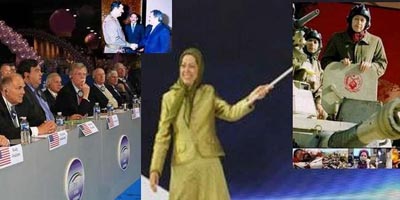Why is a Texas Congressman inviting the political leader of a former Iranian terrorist group to testify about ISIS and Islamic Extremism before a House subcommittee on terrorism?
WASHINGTON — Maryam Rajavi, acting president of the National Council of Resistance of Iran (NCRI), will address the House Foreign Affairs’ Subcommittee on Terrorism, Nonproliferation, and Trade about the Islamic  State of Iraq and Syria ( Islamic State of Iraq and Syria).
State of Iraq and Syria ( Islamic State of Iraq and Syria).
The NCRI is the political wing of the People’s Mujahedeen of Iran, also known as the MEK in its Persian acronym. The group is a former terrorist organization, which, according to the FBI, killed American citizens in Iran in the 1970s, was involved in the 1979 hostage crisis, and attempted to overthrow the Iranian revolutionary government with the help of Saddam Hussein during the Iran-Iraq War.
Al Monitor reports Rajavi was invited by Texas Rep. Ted Poe, the chair of the subcommittee, to testify about the dangers ISIS poses to MEK members at Camp Liberty in Iraq. Poe is quoted as saying about the hearing: “This hearing will explore what drives ISIS and how we can use ISIS’ ideology against it.”
The MEK rose to fame in Washington in 2002, when it publically revealed that Iran was enriching uranium at a secret location called Natanz. However, it has since been revealed that the U.S. was already aware of the site and had even provided details about it to the International Atomic Energy Agency.
The group’s most recent foray into the international spotlight came in February, when they claimed to have revealed another secret nuclear site near Tehran called Lavizan-3. Yet this revelation has garnered little attention, as nuclear nonproliferation experts do not believe the NCRI’s claims are credible. Further, there is a stronger understanding now that the MEK intends to upset the nuclear negotiations between the P5+1 countries and Iran by any means necessary.
Jeffrey Lewis, director of the East Asia Nonproliferation Program at the James Martin Center for Nonproliferation Studies, wrote last month in Foreign Policy: “[T]here is every reason to think the latest allegations by NCRI represent a politically motivated effort to derail the engagement of Iran over its nuclear program.”
Likewise, State Department spokeswoman Jen Psaki told a Februar press briefing: “We don’t have any information at this point in time to suggest the [NCRI’s] conclusions are accurate.”
The MEK was removed from the State Department’s terrorism list three years ago after a concerted lobbying campaign, which featured some of the most prominent politicians and officials in the U.S., including John Bolton, former U.S. ambassador to the United Nations; Tom Ridge, former director of Homeland Security; and Rudy Giuliani, former mayor of New York City.
A MintPress News investigation into this campaign revealed that claims made by the MEK and their supporters in the U.S. government are not grounded in truth and are laden with legalistic terms to confuse basic historical facts.
Despite this, Raymond Tanter, a former member of the National Security Council under Ronald Reagan, recently wrote an article in Townhall praising the subcommittee for selecting Rajavi as a witness for the hearing. He wrote: “As a prodemocracy woman with a moderate view of Islam, Rajavi represents the opposite of the misogynous Iranian regime’s rulers.”
Tanter added that Rajavi is a good candidate to testify because the subcommittee members will be able to ask how her how she’s dealt with Islamic extremists in the past and how to counter radical Islam.
The problem with this reasoning is that the MEK is a kind of cult, according to the FBI, Human Rights Watch, the Rand Corporation, and just about every other organization which has investigated the group. It is precisely the kind of organization that should not testify about Islamic extremism.
Jeremiah Goulka, author of “The Mujahedin-e Khalq in Iraq: A Policy Conundrum,” a report published by the Rand Corporation in 2009, told MintPress, “At the MEK camps, there’s a whole set of practices that are all textbook out of cult theory – sleep deprivation, make-work projects… forced celibacy, forced divorce, [and] gender segregation.”
Masoud Banisadr, a former member of the MEK, who had served as the group’s representative to the United Nations and the U.S., confirmed that forced divorces were common in the group. Banisadr told MintPress: “All members were forced to divorce their spouses, and later they have to send their children abroad to Europe and United States to be adopted by supporters and other members.”
The group currently has an office on Pennsylvania Avenue in Washington, where they launch campaigns related to Iran, attend congressional legislative hearings about the country, and attempt to influence public perception of the current regime.
Former Iranian Terrorist Group, MEK, To Testify Before Congress
By Sean Nevins , Mint Press News

